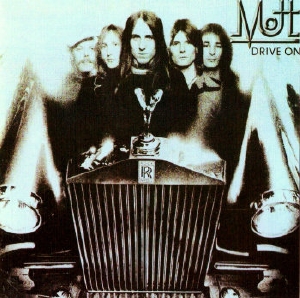

Arranged, produced and directed by Mott
Overend Watts Bass guitar, Vocals
Nigel Benjamin Lead Vocals, Guitar
Morgan Fisher Piano Organ, Synthesiser, Vocals
Ray Major Lead Guitar, Vocals
Dale Griffin Drums, Vocals
Engineers: Geoff Emerick and Alan Harris
Musical Co-ordinator Morgan Fisher
Recorded by Alan 'the loveliness of' Harris with Ron Fawcus at Clearwater Castle, Gloucestershire, england in Ronnie Lane's Mobile Studio, April 28th - May 20th 1975. Master Mix and final overdubs by Geoff Emerick with Pete Henderson and Gary Edwards at AIR(London) Studio No.3, Oxford Street, London w.1 May 23rd - June 9th 1975.
Mott Management: Fred Heller Enterprises Ltd., Associate Sunny Schnier, Dobbs Ferry on the Hudson, New York
London Office: Associate Stan Tippins and Gerry Mantell-Sayer
Motts Mann: Chris Whitehouse
Album mastered by Arun Chakraverty at CBS Studios, Whitfield Street, London
Art Direction: Roslav Szaybo (CBS Records)
Sleeve Design: Michael Farrell
Photography: Peter Lavery, Mike Putland
Front cover photo: Roger Bamber
Few bands have a sadder coda than Mott the Hoople. Top of their game for three glorious years, one of the U.K.'s best-loved bands for six, the group should have come to a grinding halt the moment frontman Ian Hunter walked out. They'd lost key members before, of course: organist Verden Allen, who composed one of the finest songs in the band's entire repertoire, the churning "Soft Ground"; guitarists Mick Ralphs and Ariel Bender, both of whom drove the group to distinctly different, but similarly spellbinding peaks during their years of lieutenanthood. But Hunter was different. Not only did he sing the majority of the songs, he wrote them as well, while his public image — long fizzy hair, omnipresent shades — was so universally well-known that, to many onlookers (the staunchest fans included), he WAS Mott the Hoople. Rhythm section Overend Watts and Bufin, and latter-day keyboard player Morgan Fisher felt otherwise. Recruiting two unknowns to fill the void (guitarist Mick Ronson departed with Hunter) and abbreviating the band name to its most recognizable syllable, the trio began work on a new album almost immediately — and one still wonders what was really going on in their minds. Of the five, only Watts had any songwriting experience to call upon; indeed, his "Born Late 58" was one of the highlights of 1974's The Hoople album. But any hopes that he might blossom à la an ex-Beatles George Harrison, or post-Vince Clarke Martin Gore were soon to crumble. The best songs (the first 45, "Monte Carlo," the driving "It Takes One to Know One") have absolutely nothing to do with the Hoopling of old; the worst (pretty much the rest of the record) are those which admit that fact. Mott emerged a dour, dry little record, its contents content to scour the rockiest edges of the old band's charm, but with none of the humor, none of the élan, and certainly none of the temperamental flash which made the original band so special. And to think, this was only their first album.